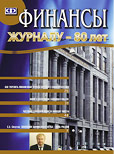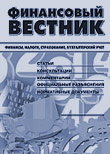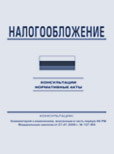Содержание
Актуально
Р.Р. Гайзатуллин, министр финансов Республики Татарстан
E-mail: minfin@tatar.ru
В статье отражено внедрение в Республике Татарстан Единой системы бухгалтерского учета и расчета заработной платы, которая стала еще одним этапом на пути формирования в республике основы целостной системы управления финансами как информационного пространства, аккумулирующего в себе все этапы бюджетного процесса (от этапа планирования до этапа составления отчетности).
В ближайшее время планируется организация взаимодействия Единой системы с другими используемыми учреждениями государственного сектора Республики Татарстан информационными системами и площадками.
Ключевые слова: система управления общественными финансами, единая система бухгалтерского учета и расчета заработной платы, комплексная система управления бюджетными расходами.
Финансы и бюджет: проблемы и решения
Е.А. Ермакова, профессор кафедры финансов и налогообложения Саратовского социально-экономического института (филиала) Российского экономического университета имени Г.В. Плеханова, доктор экономических наук, профессор
E-mail: eae13@mail.ru
В статье обобщены финансовые показатели реализации проектов инициативного бюджетирования в регионах России, представлена характеристика механизмов финансового обеспечения проектов на основе софинансирования, выделены особенности практики поддержки местных инициатив на территории Саратовской области, выявлены некоторые финансовые проблемы.
Ключевые слова: инициативное бюджетирование, вовлечение граждан в управление, проект поддержки местных инициатив.
Казначейство: становление и развитие
М.М. Эльканов, заместитель руководителя Управления Федерального казначейства по Карачаево-Черкесской Республике
E-mail: ufk79@roskazna.ru
В статье рассматриваются основные положения казначейского сопровождения в 2019 г. и его особенности, приведены основные документы, на основании которых осуществляется казначейское сопровождение, нормативно-правовая база обеспечения казначейского сопровождения, обозначены некоторые исключения казначейского сопровождения в 2019 г., порядок осуществления казначейского обеспечения обязательств при казначейском сопровождении целевых средств, формы документов, применяемых при казначейском обеспечении обязательств при казначейском сопровождении целевых средств и порядка их заполнения.
Ключевые слова: Федеральное казначейство, территориальные органы Федерального казначейства, казначейское сопровождение, целевые средства, федеральный бюджет.
Налоги: теория и практика
Н.И. Малис, профессор департамента налоговой политики и таможенно-тарифного регулирования Финансового университета при Правительстве РФ, заслуженный профессор университета
E-mail: Malis.nina@mail.ru
Анализируется сложившаяся в России к настоящему моменту система налогообложения малого и среднего бизнеса. Автор полагает, что для реализации целей нацпроекта по МСБ и повышения его доли в ВВП требуется создать благоприятные налоговые условия и сохранить существующие. Автор высказывает свои соображения по поводу введения налога на профессиональный доход, налогообложения граждан СНГ, работающих в России, выражает сомнения по поводу целесообразности отмены ЕНВД.
Ключевые слова: специальные налоговые режимы, численность занятых, сектор МСБ (малого и среднего бизнеса), эффективность налоговых льгот, налог на профессиональный доход, платежи за патент, отмена ЕНВД.
E-mail: finvestnik@mail.ru
В обзоре Э.С. Гребенщикова затрагивается широкий спектр вопросов, поднятых на налоговом форуме, излагаются основные тезисы доклада главы ФНС М.В. Мишустина, включая вклад службы в поддержание добросовестной конкуренции на рынке, президента ТПП С.Н. Катырина, ряда известных экспертов. Высказывалось беспокойство по поводу растущей налоговой нагрузки на малый и средний бизнес. Члены ТПП также обозначили свое отношение к таким темам, как декриминализация ответственности за предпринимательскую деятельность, кодификация неналоговых платежей.
Ключевые слова: налоговое администрирование, ФНС как сервисная служба, налоговый мониторинг, маркирование товаров, документальная прослеживаемость, налоговые правонарушения, защита прав предпринимателей.
Страхование
С.В. Дедиков, партнер Redstone chambers, преподаватель РАНХиГС
E-mail: Dedikov.sv@mail.ru
Автор статьи исследует вопросы нормативного регулирования единого договора страхования, содержащего элементы обязательного страхования гражданской ответственности владельцев транспортных средств и добровольного страхования каско транспортного средства. Дается критический анализ проекта указания Центрального банка РФ по данному вопросу. Сформулированы конкретные предложения по регулированию. К статье прилагается редакционный комментарий, акцентирующий внимание на возможностях заключения комбинированных договоров страхования при существующей законодательной базе.
Ключевые слова: нормативное регулирование, договор ОСАГО, каско, единый договор, транспортное средство, правила страхования.
Э.С. Гребенщиков, кандидат исторических наук
E-mail: finvestnik@mail.ru
Статья посвящена анализу новых подходов к страхованию с господдержкой агрорисков, позволивших в 2019 г. переломить тенденцию к падению страховых сборов и резкому сокращению застрахованных площадей. Более внимательно стали учитываться пожелания и запросы сельхозтоваропроизводителей. Изменения особенно очевидны на стороне предложения. Автор акцентирует внимание на том, что многие аграрии давно страхуются на коммерческой основе, не прибегая к бюджетным субсидиям. Приводятся данные об активизации работы российских агростраховщиков и росте доли агрорисков в их страховых портфелях.
Ключевые слова: субсидируемое страхование, сельхозтоваропроизводители, коммерческое страхование, параметры рынка, статистика выплат, международный опыт, фактор перестрахования.
Финансовые рынки
А.И. Бородин, профессор кафедры финансового менеджмента РЭУ им. Г.В. Плеханова, доктор экономических наук
E-mail: Borodin.AI@rea.ru
О.В. Литвишко, доцент кафедры финансового менеджмента РЭУ им. Г.В. Плеханова, кандидат экономических наук
E-mail: Litvishko.OV@rea.ru
Д.В. Зинчук, магистр финансов РЭУ им. Г.В. Плеханова
E-mail: beardiego2304@gmail.comu
В статье рассмотрено текущее положение России в сфере альтернативного финансирования, описаны проблемы, замедляющие развитие данного рынка, определены перспективы его развития для усиления технологического потенциала страны. Так, приоритетными аспектами при создании оптимальной модели рынка являются устранение законодательных барьеров и образование комфортной среды. Модель развития российского рынка альтернативных финансов должна основываться на концепции мягкого права, опираясь преимущественно на институты саморегулирования и стандарты раскрытия информации и защиты прав инвесторов при активном участии в становлении рынка институтов развития. Учитывая то, что на финансовом рынке наблюдается дефицит финансовых ресурсов, рынок альтернативного финансирования обеспечит достижение синергетического эффекта между запросами населения на создание инновационных инфраструктурных объектов и готовностью к инвестированию средств в их реализацию и установкой государства на поддержку таких инициатив.
Ключевые слова: альтернативное финансирование, инвестиции, рынок, развитие, краудфайдинг, регулирование.
Корпоративные финансы
К.Л. Астапов, ведущий научный сотрудник Центра стратегических исследований МГУ им. М.В. Ломоносова, доктор экономических наук, EMBA
E-mail: Ast_K@mail.ru
В данной статье рассматривается роль стратегий и приобретений компаний в финансовой стратегии компании. Именно слияния и поглощения позволяют компании быстро выйти на новые рынки и приобрести новые технологии. Но слияния и поглощения зачастую разрушают акционерную стоимость, поскольку во многих случаях требуют существенных финансовых затрат, а руководство компании недооценивает риски, связанные со слияниями. Именно поэтому сделки слияния и поглощений должны задаваться стратегией компании.
Ключевые слова: стратегия компании, трансформационные преобразования, слияния и поглощения, капитализация компании.
Финансовый контроль и аудит
О.Б. Иванова, профессор кафедры «Финансы» Ростовского государственного экономического университета (РИНХ), доктор экономических наук, профессор
E-mail: sovet2-1@rsue.ru
О.И. Карепина, доцент кафедры «Финансы» Ростовского государственного экономического университета (РИНХ), кандидат экономических наук, доцент
E-mail: karepindima@mail.ru
В статье рассматриваются вопросы развития государственного финансового контроля за реализацией национальных проектов на региональном уровне в условиях программно-проектного бюджетирования и цифровой трансформации. Авторы отмечают, что современные подходы к формированию национальных проектов реализуются в значительно изменившихся институциональных и экономических условиях, что требует теоретико-методологического обоснования в части внедрения новых инструментов государственного финансового контроля в области реализации национальных проектов на федеральном и региональном уровнях, базирующихся на цифровых технологиях.
Ключевые слова: государственный финансовый контроль, государственный аудит, национальные проекты, региональные проекты, цифровая трансформация.
Финансы социальной сферы
О.П. Овчинникова, профессор кафедры прикладной экономики Российского университета дружбы народов», доктор экономических наук, профессор
E-mail: n.e.ovchinnikova@mail.ruu
Н.Э. Овчинникова, независимый исследователь, кандидат экономических наук
E-mail: n.e.ovchinnikova@mail.ru
В настоящее время система высшего образования сталкивается с новыми вызовами, которые требуют современных способов решения. Ежегодное сокращение бюджетного финансирования заставляет университеты создавать новые способы получения финансовых средств. Внешние тренды (старение населения, миграция молодежи, тренд на получение среднего профессионального образования) стимулируют к трансформации модели высшего образования. В данной статье автор раскрывает ключевые аспекты финансирования высшего образования, а также рассматривает перспективы модели финансирования высшего образования на 2030 г. в условиях вызовов цифровой экономики.
Ключевые слова: финансовая модель, университет, высшее образование, старение населения, цифровая экономика.
Информация
Редакционные заметки с экспертной сессии Центра стратегических разработок (конец октября 2019 г.), посвященной реализации Основных направлений налоговой политики РФ на 2020 г. и плановый период 2021–2022 гг.
Annotation
TOPICAL
R.R. Gayzatullin, Minister of finance of the Republic of Tatarstan
E-mail: minfin@tatar.ru
The article considers the introduction in the Republic of Tatarstan of a unified system of accounting and payroll, which has become another step towards the formation in the republic of a integral financial management system as an information space that reflects all stages of the budget process (from the planning stage to the reporting stage).
In the near future, it is planned to organize the interaction of the Unified System with other information systems and platforms used by the public sector institutions of the RT.
Keywords: public finance management system, a unified system of accounting and payroll, an integrated system of budget spending management.
FINANCE AND BUDGET: PROBLEMS AND SOLUTIONS
E.A. Ermakova, Professor of the Department of finance and taxes, Saratov Socio-Economic institute, doctor of economic sciences
E-mail: eae13@mail.ru
The article summarizes the financial indicators of the implementation of initiative budgeting projects in the Russian regions, presents a description of the mechanisms for financial support of projects based on co-financing, highlights the features of the practice of supporting local initiatives in the Saratov region, and sheds light on some financial problems.
Keywords: initiative budgeting, citizens’ involvement in management, local initiatives support program.
TREASURY: FORMATION AND DEVELOPMENT
M.M. Еlkhanov, the deputy head of the UFK in the Karachay-Cherkess Republic
E-mail: ufk79@roskazna.ru
The article examines the main provisions of Treasury support in 2019 and its features, describes the basic documents relating to the Treasury support, relevant legal and regulatory framework. The author singles out some exceptions from Treasury escorts in 2019, writes how treasury obligations are carried out to ensure that commitments of the Treasury to earmark funds and targeted means are fulfilled. He also considers the set of documents the treasury relies on.
Keywords: Federal Treasury, territorial bodies of Federal Treasury, Treasury support, target funds, Federal budget.
TAXES: THEORY AND PRACTICE
N.I. Malis, professor at the department of tax policy and customs and tariff regulation, Financial university under the Government of the Russian Federation, honored professor of the university
E-mail: Malis.nina@mail.ru
The author analyzes the current tax system in Russia pertaining to the small and medium-sized businesses. She believes that in order to achieve the goals of the national SME project and increase their share in GDP, it is necessary to create favorable tax conditions and preserve the existing ones. The author expresses her view on the introduction of a new tax on professional income, taxation of CIS citizens working in Russia and has second thoughts regarding the advisability of early abolishing of a unified tax on imputed income.
Keywords: special tax regimes, number of employees, SME sector (small and medium-sized businesses), the effectiveness of tax benefits, professional income tax, patent payments, cancellation of imputed tax.
E-mail: finvestnik@mail.ru
Dr E.S. Grebenshchikov addresses a wide range of issues raised at the 2019 tax forum, convened by the Trade and industry chamber of RF, outlines the main points of the report of the head of the Federal tax service M.V. Mishustin. The latter spoke about contribution of tax authorities toward maintaining fair competition in Russian economy and on the market. Special emphasis in his presentation was on the benefits which the process of all-out digitalization creates for tax administration and also on «horizontal monitoring». The President of the Chamber S.N. Katyrin, supported by a number of renowned experts, expressed concern with the growth of tax burden on small and medium-sized businesses. Chamber members also outlined their attitude to such topics as decriminalization of responsibility for entrepreneurial activity, codification of non-tax payments and other central issues influencing the development of Russian economy.
Keywords: tax administration, Federal tax authority as a provider of services, tax monitoring, labeling of goods, documentary traceability of goods movement, tax violations, protection of the rights of entrepreneurs.
S.V. Dedikov, partner of Redstone chambers, teacher at RANEPA
E-mail: Dedikov.sv@mail.ru
The author of the article explores the regulatory issues of a single insurance contract containing elements of compulsory third party liability insurance of vehicle owners and voluntary comprehensive (casco) automobile insurance. A critical analysis of the draft instruction of the Central Bank of the Russian Federation on this issue is presented. S.Dedikov articulates possible solutions to problems emerging in the process of creation of a complex unified motor insurance policy. An editorial comment attached to the reviewed article underlines its main message: existing legislation permits to sell combined insurance contracts without introduction of major changes into the insurance law.
Keywords: normative regulation, compulsory third party liability insurance contract, comprehensive automobile insurance, single contract, insured vehicle, insurance rules.
E.S. Grebenshchikov, candidate of historical sciences
E-mail: finvestnik@mail.ru
The article is devoted to the analysis of new approaches to subsidized insurance of agricultural risks, which made it possible to reverse during 2019 the trend of decreases in the volume of insurance premium and deep reduction of the acreage of insured areas. The interests and requests of agricultural producers are more carefully taken into account , more flexible insurance products have been offered. Changes are quite obvious especially on the supply side and reflected in the statistics. The author underlines the fact that many farmers are insured on commercial terms, without applying for budget subsidies. This type of market oriented insurance proved to be viable. Meanwhile the competition in the segment of agroinsurance increased sharply lately due to the rising involvement of major market players. The price of insurance contracts, on the contrary, went down. Another good sign is that the share of agricultural risks (measured by premiums paid) in total insurance portfolio has enlarged with greater number of insurance contracts signed.
Keywords: agricultural producers, crops, subsidized insurance, commercial insurance, market parameters, indemnity statistics, international experience, reinsurance factor.
FINANCIAL MARKETS
A.I. Borodin, professor at the department of financial management, Plekhanov Russian university of economics, doctor of economic sciences
E-mail: Borodin.AI@rea.ru
O.V. Litvishko, associate professor of the chair of financial management, Plekhanov Russian university of economics, candidate of economic sciences
E-mail: Litvishko.OV@rea.ru
Dm.V. Zinchuk, master of science in Plekhanov Russian university of economics
E-mail: beardiego2304@gmail.com
The article considers the current situation of Russia in the field of alternative financing, describes the problems that slow down the development of this market, identifies the prospects for the development of this sphere to strengthen the technological potential of the country. Thus, the prioritised aspects in creating an optimal market model are the elimination of legislative barriers and the formation of a comfortable environment. The model of development of the Russian alternative finance market should be based on the concept of soft law, relying mainly on self-regulatory institutions and standards of disclosure and protection of investors' rights with active participation of development institutions. Given a shortage of financial resources, the market of alternative financing will ensure the achievement of a synergistic effect between the population's requests for innovative infrastructure facilities and the willingness to invest in their implementation and the state's commitment to support such initiatives.
Keywords: alternative financing, investment, market, development, crowdfunding, regulation.
FINANCIAL MARKETS
K.L. Astapov, leading researcher at the Center for strategic studies, Lomonosov Moscow state university, doctor of economic sciences, EMBA
E-mail: Ast_K@mail.ru
This article discusses the role of mergers and acquisitions in financial strategy of companies. It is mergers and acquisitions that allow the company to swiftly enter new markets and acquire new technologies. But M & A often destroy shareholder value, since in many cases they entail significant financial costs, and company management underestimates the risks associated with mergers. That is why mergers and acquisitions should be set by the company's strategy.
Keywords: company strategy, transformations, mergers and acquisitions, company capitalization.
FINANCIAL CONTROL AND AUDITING
O.B. Ivanova, professor at the Department of finance, Rostov state economic university, doctor of economic sciences, full professor
E-mail: sovet2-1@rsue.ru
O.I. Karepina, associate professor at the Department of finance, candidate of economic sciences, full associate professor
E-mail: karepindima@mail.ru
The article deals with the development of state financial control over the implementation of national projects at the regional level in terms of program-budgeting and digital transformation. The authors note that modern approaches to the formation of national projects are implemented in significantly changed institutional and economic conditions, which require a theoretical and methodological justification in terms of introducing new tools of state financial control over the implementation of national projects at the federal and regional levels based on digital technologies.
Keywords: state financial control, state audit, national projects, regional projects, digital transformation.
O.P. Ovchinnikova, professor at the chair of applied economics of the Russian Friendship of peoples university
E-mail: n.e.ovchinnikova@mail.ru
N.E. Ovchinnikova, independent researcher, candidat of economic sciences
E-mail: n.e.ovchinnikova@mail.ru
Currently, the higher education system is facing new challenges that require modern solutions. The annual reduction in budget funding forces universities to create new ways of obtaining financial resources. External trends (population ageing, youth migration, the trend towards vocational education) stimulate the transformation of higher education models. In this article, the author reveals the key aspects of financing higher education, and also examines the prospects of a evolution of financial model of higher education by 2030 in the face of the digital economy challenges.
Keywords: financial model, university, higher education, population ageing, digital economy.
INFORMATION
Editorial notes from the expert session of the Center for strategic research (end of October 2019), devoted to the implementation of the Main directions of the tax policy of the Russian Federation for 2020 and the planning period 2021-2022.













